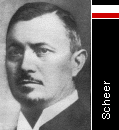Scheer: Difference between revisions
No edit summary |
mNo edit summary |
||
| Line 1: | Line 1: | ||
<p align="right"> [[Main_Page | WWI Document Archive ]] > [[WWI_Biographical_Dictionary|Alphabetical Index of WWI Biographies]] > [[S-Index]] > '''Scheer''' </p><hr> | |||
[[image:MASTHD-C.GIF]] | [[image:MASTHD-C.GIF]] | ||
| Line 14: | Line 16: | ||
<hr> | <hr> | ||
<p align="right"> [[Main_Page | WWI Document Archive ]] > [[WWI_Biographical_Dictionary|Alphabetical Index of WWI Biographies]] > [[S-Index]] > '''Scheer''' </p><hr> | |||
Latest revision as of 16:08, 28 July 2009
WWI Document Archive > Alphabetical Index of WWI Biographies > S-Index > Scheer
Scheer, Rheinhard (1863-1928) Born in Obernkirchen, Hanover.
Admiral Scheer commanded the German High Seas Fleet in its most famous battle, the battle of Jutland in 1916.
Scheer was appointed Chief of Staff of the High Seas Fleet in 1910. He commanded a battle squadron in 1913. He gained fame as a submarine strategist and was an advocate of submarine warfare after the outbreak of the Great War.
Even though the British Grand Fleet outnumbered Scheer's High Seas Fleet, his successful manouevring inflicted heavy losses on the British in the battle of Jutland. Both sides proclaimed victory. The British fleet suffered far greater losses, but the German fleet never ventured out of port again, essentially yielding the field to the British.
Scheer succeeded Henning von Holtzendorff as chief of the admiralty on August 8, 1918. He served five months before retiring. He wrote a book giving his account of Jutland: Deutschlands Hochsseeflotte im Weltkrieg, (1919) -- Germany's High Seas Fleet in the World War, (1920)
WWI Document Archive > Alphabetical Index of WWI Biographies > S-Index > Scheer

